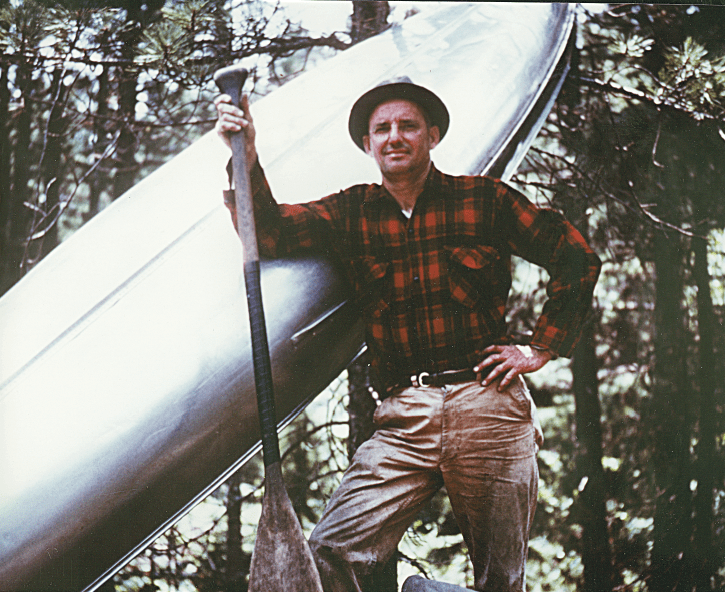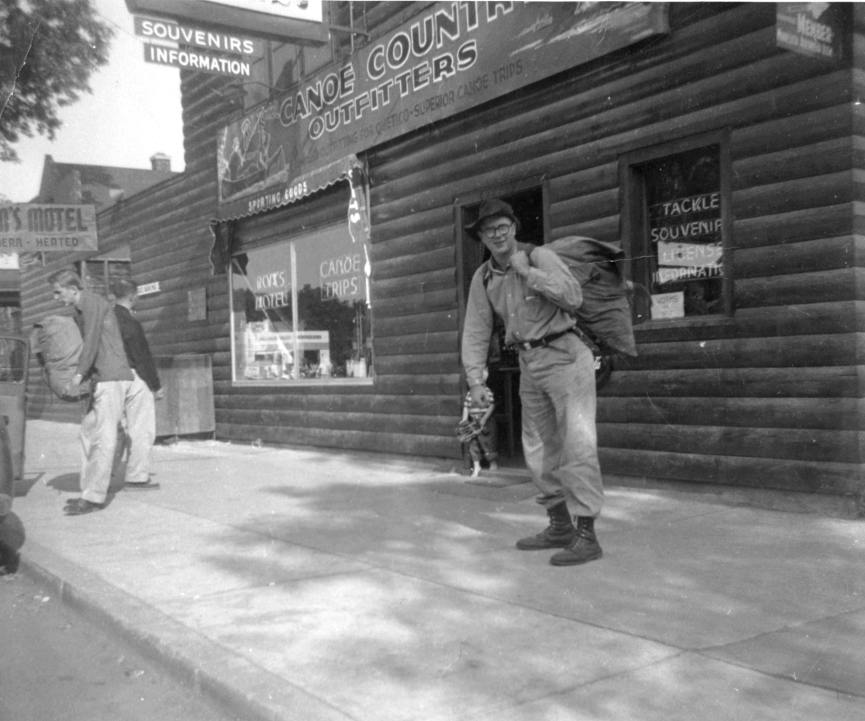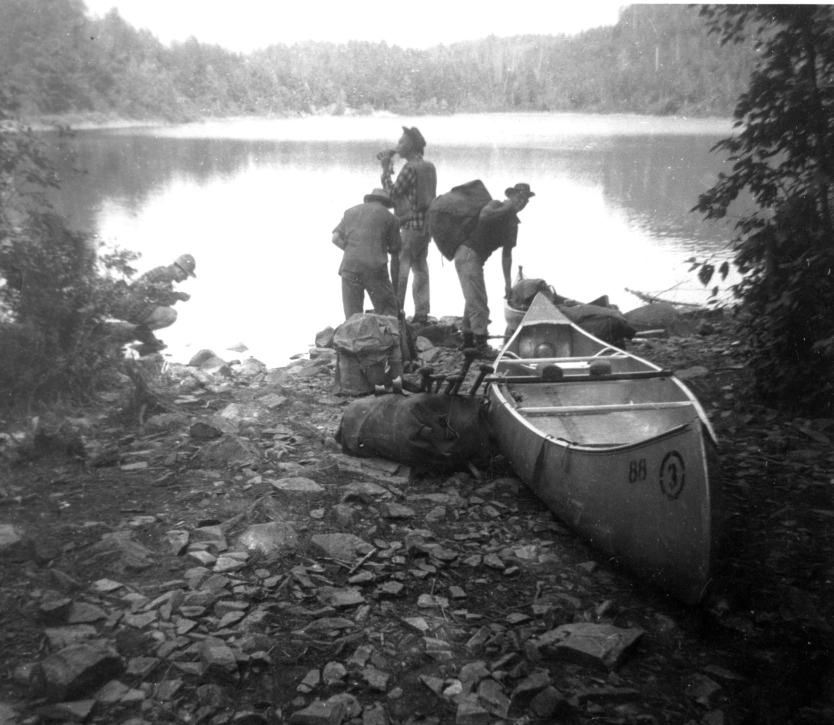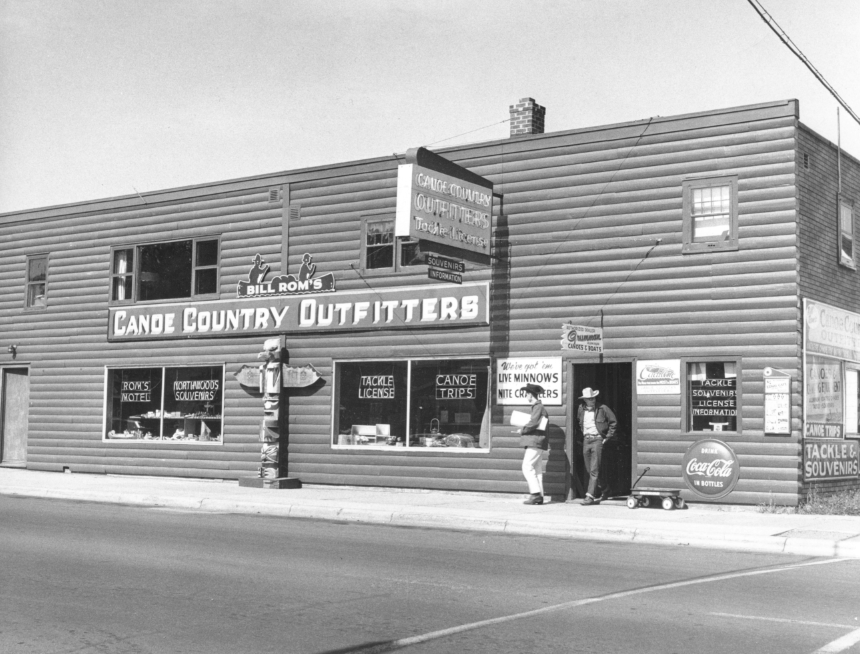
Ely, Minnesota boasts over twenty outfitters that send visitors into the Boundary Waters Canoe Area Wilderness. Campers rent the latest gear, groan under the weight of a canoe without realizing it wasn’t always this easy to carry, and rest assured that next year’s trip will find canoe country as pristine as it is today. It’s easy to forget – or never even realize – that these things weren’t always a given. The individuals who worked to make it so, like Barb and Bill Rom, aren’t widely known for their dedication to preserving the wilderness. Yet they should be. As the original proprietors of Canoe Country Outfitters, they started their business when only two other outfitters existed in Ely, and the Boundary Waters’ future was uncertain. Their efforts helped ensure the future of what has become a Minnesota rite of passage: the annual canoe trip.

From Humble Beginnings to the “Canoe King of Ely”
At the height of their business, it was difficult not to know of the Roms. A 1960s article in Argosy Magazine dubbed Bill the “Canoe King of Ely,” and for good reason. Canoe Country Outfitters was the largest canoe outfitter in the world and the largest Grumman canoe dealer in North America. The Roms’ initial fleet of 10 wood canvas canoes had grown to over 400 canoes. An estimated eight out of ten groups were repeat customers, and campers came from across the country and even the world.
It all started with a more humble dream. In 1946, Bill left the Navy after World War II. He moved his West Coast bride and their firstborn son to his hometown of Ely to start a boys’ canoe camp. He wasted no time and took about ten boys into canoe country that first summer back. Yet the area was growing popular as a vacation destination. The demand was overwhelming the outfitters in town, and the Roms began receiving requests to rent out gear. They quickly learned that outfitting adults was far easier than homesick boys; Canoe Country Outfitters was born.
Purchasing a vacant lot from Bill’s mother that was once the family garden, they built their outfit on Sheridan Street. What began in happenstance turned into nearly 30 years of prepping campers for the Boundary Waters experience. Their daughter, Becky, attributes their success to two factors: constant innovation in gear and unparalleled personal attention.
Whether forgoing bedrolls for army surplus sleeping bags or working with canoe manufacturers to develop a more comfortable portage yoke and a side-mount for motors, they were always the first to use the newest gear. And they ran their business with an unprecedented emphasis on personal service. Bill answered every mail order reservation by hand the day it was received and the phone was always answered. Even in the middle of dinner.
To this day, Becky runs into former customers who still believe they are close personal friends of Bill’s. Yet the Roms’ influence is even greater, still. At the heart of it all was a passion for the land that led them to fight for its preservation in ways that can still be appreciated today.
A Lifelong Passion for the Land
Bill grew up across the alley from the vacant lot that would become Canoe Country Outfitters. His father passed away shortly after his birth, so his mother raised Bill and his eight siblings alone through the depression. To help support the family, Bill and his brothers hunted, fished and picked berries all over the region. Some days Bill walked as far as Farm Lake for a single fishing trip. He developed a knowledge and a love of the land that he truly learned to appreciate as a student of Sigurd Olson at Ely Junior College, where he was exposed to some of Sigurd’s earliest writing.
Sigurd was the school’s dean at the time and just beginning to delve into the writing and advocacy he would become known for. Bill had a job cleaning his office and laboratory, and he credits Sigurd with inspiring his passion for the preservation of the wilderness. It was under his
guidance that Bill found summer employment with the Forest Service, and found the inspiration to study Wildlife Management at the University of Minnesota. Throughout his college years, he built the Kekekabic Trail, manned the fire tower on Kekekabic Lake while conducting a biological study for the U of M, and worked a portage and campsite maintenance crew. Living and working in the wilderness in this way deepened the connection to the land that he would carry with him throughout his years in the Navy.

Family Outfitter Turned Wilderness Advocate
When Bill returned to Ely after the war, the pristine wilderness had changed. The creation of the Superior Roadless Area during the 1920s had slowed development, but during Bill’s absence the increasing affordability of airplanes had resulted in a boom in fly-in resorts. By the mid-1940s there were 16 resorts on Basswood Lake alone, and Ely had become North America’s largest inland seaplane base. Bill was an avid pilot himself, but he saw this development as a threat to the wilderness. As he built his business, he took an active role in fighting for the boundary waters.
Others did as well, and an airspace reservation was proposed over the roadless area. Bill spoke out in favor of the air ban, and a fellow supporter, Bill Magie, formed Friends of the Wilderness to fight for it. Bill hosted meetings in his home, and in a town where many made their livelihood off these resorts, Bill’s was not the popular opinion. During the height of the debate, an explosive was set off near the Roms’ house as a scare tactic.
State and Federal air bans were enacted in 1949, but fly-ins continued for four years as the constitutionality of the air bans was challenged. It was the first of many development threats during Bill and Barb’s tenure at Canoe Country Outfitters. Logging, the introduction of new roads, snowmobile access, and the motorized debate all rose to the forefront of public debate. And throughout it all, Bill steadfastly spoke against the encroachments and worked for the preservation of the wilderness.
He was one of the first to suggest that cans and bottles be prohibited in canoe country to prevent the garbage piling up at portages. He used his own plane to patrol for illegal activities, wrote letters, spoke out at Chamber of Commerce and outfitter meetings, and testified in Washington in 1974 against motorized access.
Bill’s public support of regulation resulted in continued local tensions, and the explosion during the air ban debate was not the last time it culminated in harassment. During the snowmobile and motorized debates of the 1970s, it was not uncommon for snowmobiles to circle the Rom house at all hours of the night. In 1975, the enactment of a snowmobile ban resulted in major protests on Fishing Opener and Memorial Day weekends. Protestors barricaded Ely, letting drivers pass only if they signed a petition in favor of snowmobiles. They simultaneously barricaded and picketed Canoe Country Outfitters with signs that read “Run the bum Rom out of town.”

End of an Era
To fight for the canoe country wilderness was never a question for Bill. It was more than his livelihood; it was his passion. Still, the tension took its toll, and a heart condition left him susceptible to stress. In 1975 the Roms sold their business to a long time employee.
Now ninety years old, Bill looks back pragmatically. He and Barb are both quick to point out that someone had to protect the wilderness, in spite of the tension it caused. It’s clear their dedication was about more than standing up for their beliefs. It was about a passion for the land, and a dedication to doing the right thing.
While the Roms ran Canoe Country Outfitters, Bill stopped by the post office every single Saturday to pick up the mail. Mail was only delivered during the week in those days, and he had customers waiting for their reservations. He brought this same steady perseverance to the fight for the boundary waters, helping to lay the ground work for preservation that continues to serve those who make the annual pilgrimage north. It’s the least we can do to remember his name when we sweat across a portage under the yoke of a canoe, a portage that Bill Rom just might have built.
By Alissa Johnson, Wilderness News Contributor
This article appeared in Wilderness News Fall 2007

